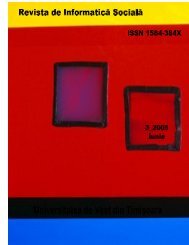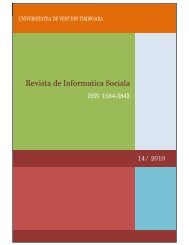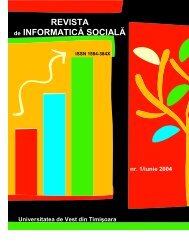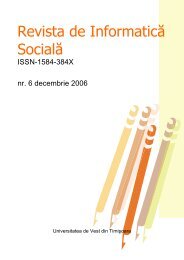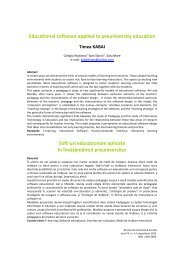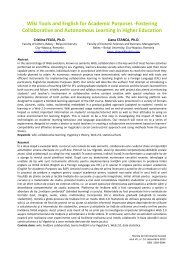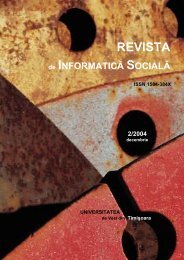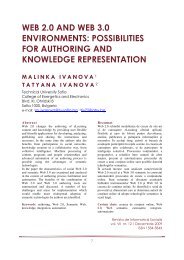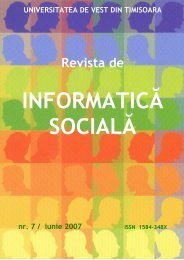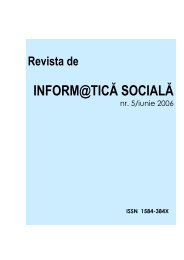No 13 - Journal of Social Informatics / Revista de Informatica Sociala
No 13 - Journal of Social Informatics / Revista de Informatica Sociala
No 13 - Journal of Social Informatics / Revista de Informatica Sociala
You also want an ePaper? Increase the reach of your titles
YUMPU automatically turns print PDFs into web optimized ePapers that Google loves.
THE INFLUENCES OF<br />
INTRODUCING NEW<br />
TYPES OF EDUCATION<br />
OVER HUMAN FACTOR<br />
PSYCHOINDIVIDUAL<br />
DEVELOPMENT<br />
Elvira NICA 1 , Gheorghe H. POPESCU 2<br />
1 The Bucharest Aca<strong>de</strong>my <strong>of</strong> Economic Studies<br />
email: popescu_elvira@yahoo.com<br />
2 “Dimitrie Cantemir” Christian University Bucharest<br />
R.I.S.<br />
ABSTRACT<br />
Information and communication technology has known a significant growth<br />
in recent years allowing progress towards a new stage <strong>of</strong> human society -<br />
the information society, ensuring the economic growth un<strong>de</strong>r increased<br />
environmental protection conditions, with the primary consequence:<br />
reducing physical consumption in favor <strong>of</strong> information and knowledge<br />
capitalization.<br />
Thus, education as an oriented, organized and aware process enforces its<br />
role as a fundamental pillar within the human capital psycho-individual<br />
<strong>de</strong>velopment, as the new education is <strong>de</strong>signed to support human<br />
adaptation to the requirements <strong>of</strong> an existing digitized environment.<br />
Therefore, all this leads to the resizing <strong>of</strong> human capital investment, namely<br />
in education, training and health, the pr<strong>of</strong>essional-scientific training <strong>of</strong><br />
human capital becoming vital.<br />
Keywords: new types <strong>of</strong> education, human factor, psycho individual<br />
<strong>de</strong>velopment, knowledge capitalization, digitized environment.<br />
REZUMAT<br />
Tehnologia informaţiei şi comunicaţiilor a cunoscut o creştere semnificativă<br />
în ultima perioadă permiţând progresul către o nouă etapă a societăţii<br />
umane-societatea informaţională, asigurând în acest sens, creşterea<br />
economică în condiţii <strong>de</strong> protecţie sporita a mediului, având drept<br />
consecinţă primară: reducerea consumului fizic în favoarea valorificării<br />
informaţiei şi a cunoaşterii.<br />
Astfel, educaţia, în calitatea sa <strong>de</strong> proces orientat, organizat şi conştientizat,<br />
îşi impune rolul <strong>de</strong> pilon fundamental în cadrul <strong>de</strong>zvoltării psihoindividuale a<br />
factorului uman, noile educaţii fiind proiectate în sprijinul adaptării acestuia<br />
la exigenţele unui mediu existenţă digitalizat.<br />
Prin urmare, toate acestea conduc spre redimensionarea investiţiei în<br />
capitalul uman, respectiv în educaţie, formare şi sănătate, pregătirea<br />
pr<strong>of</strong>esional-ştiinţifică a resurselor umane disponibile <strong>de</strong>venind vitală.<br />
VIII / <strong>13</strong><br />
2010<br />
Cuvinte cheie: noi tipuri <strong>de</strong> educație, factor uman, <strong>de</strong>zvoltare individuală



